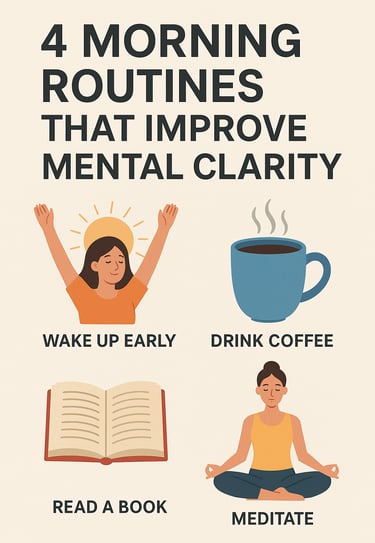DAILY BEST KNOWLEDGE
4 Morning Routines to Improve Mental Clarity, Focus, and Productivity
Boost your morning with 4 simple routines. Mindful exercise, journaling, meditation, and a healthy breakfast. Morning routines to improve mental clarity, focus, and productivity daily.
HEALTH
Iftikhar Ishaque Memon
9/23/20256 min read


Introduction
How you begin your morning can determine the quality of your day. The day for most of us is a frenzied dash of alarm clocks, buzzing cellphones, and day demands, yet consciously designing your first hour of waking can positively influence the rest of your day’s lucidity, productivity, and mood. Consistent morning rituals can lower stress levels, improve mental clarity, and increase overall levels of happiness. Morning structure controls your body’s internal clock and thus makes you more alert and focused. Even minor interventions, such as a brief walk or brief, mindful breathing, can improve the mind and help create a shield against daily stress.
But what exactly should a morning routine include if your goal is to boost mental clarity? This article explores four powerful, research-supported routines that you can adapt to your lifestyle. Each is explained in detail, with practical steps and scientific backing, so you can start your day clear-headed and confident.
1.Mindful Movement: Walking and Light Exercise
Physical activity is not just for your body. It is also a powerful tool for your brain. Engaging in mindful movement first thing in the morning increases blood flow to the brain, releases endorphins, and helps you shake off the mental cobwebs of sleep. According to the Mayo Clinic, exercise has immediate and long-term benefits for mental health, including improved attention and reduced anxiety.
Why Walking Works
A walk outside also means exposure to natural light, which is good for the daily rhythm and increases serotonin. This hormone is crucial in “feeling awake, alert, and emotionally zoned.” You will even find that a simple 10-minute walk affects your mood and clarity.
If walking is not your style, consider gentle stretching, yoga, or bodyweight exercises. These activities wake up your muscles, release tension, and prepare your mind for focused work. Regular physical activity enhances memory and problem-solving skills.
The Science Behind Movement and Clarity
Physical activity increases intellectual blood flow, thus providing oxygen and nutrients, which are linked with cognitive performance. Engaging in physical activity in the morning improves memory, attention, and problem-solving. A morning walk will also reset your body’s clock by having natural light hit you, thus increasing alertness and energy.
2.Journaling: Organize Thoughts and Practice Gratitude
Journaling is more than just writing down your to-do list. It is a proven way to organize your thoughts, reduce anxiety, and set clear intentions for the day. According to Psychology Today, journaling helps you process emotions, clarify your goals, and boost your sense of control.
The Power of Gratitude
Gratitude listing is one method of journaling. Noting three things that you are grateful for each day in the morning shifts your focus from stress to positivity. This small practice has been shown to result in higher levels of mood and flexibility, as supported by the Greater Good Science Center at UC Berkeley.
The Benefits of Morning Journaling
· Emotional Clarity: Writing about your feelings or worries helps you gain perspective and reduces mental clutter.
· Goal Setting: Outlining your top three priorities for the day increases focus and productivity.
· Gratitude Practice: Listing things you’re grateful for has been linked to greater happiness and resilience, as shown by research from the Greater Good Science Center.
How to Get Started
· Keep It Simple: Spend 5-10 minutes each morning writing whatever comes to mind.
· Use Prompts: Try questions like “What am I thankful for today? ” or “What’s one thing I want to accomplish? ”
· Combine With Planning: Integrate your to-do list or schedule to streamline your day.
3. Mindful Breathing and Meditation
Mindful breathing and meditation are among the most effective ways to clear mental fog and prepare your mind for the day’s challenges. Even a few minutes of focused breathing can lower cortisol (the stress hormone) and enhance concentration.
Techniques for Beginners
· Box Breathing: Inhale for four counts, hold for four, exhale for four, pause for four, and repeat.
· 4-7- Breathing: Inhale for four counts, hold for seven seconds.
· Guided Meditation: Use apps like Insight Timer for structured sessions.
Incorporating Mindfulness into Your Routine
· Be Consistent: Meditate at the same time every morning if possible, even if just for two minutes.
· Pair with Other Habit: Meditate immediately following a stretch or before breakfast so that it becomes an effortless integration into your routine.
· Track Your Progress: Writing about your meditation practice can help solidify the habit.
4. Nourishing Breakfast: Fuel for Mental Performance
A proper breakfast is not simply energy; rather, it is the primary source of energy for the brain and a critical beginning to the day that can support students’ mental sharpness and focus and provide energy for the day ahead. Breakfasts to avoid, other than skipping breakfast altogether, are meals made up of processed and sugary foods, as they can result in brain fog, mood swings, and concentration issues. Breakfast enhances memory, concentration, and overall cognitive function.
What Makes a Breakfast “Brain-Friendly”?
· Protein: Eggs, Greek yogurt, and nuts provide long-lasting energy.
· Whole Grains: Oatmeal and whole-grain toast offer steady glucose for your brain.
· Healthy Fats: Avocado and seeds support nerve function and mood.
· Fruits and Vegetables: Berries, bananas, and leafy greens deliver antioxidants and vitamins.
Avoiding Common Pitfalls
· Limit Sugar: High-sugar foods cause rapid spikes and crashes in energy.
· Stay Hydrated: Drink water or herbal tea alongside your meal.
· Plan Ahead: Prepare overnight oats or smoothie packs to save time.
Additional Morning Clarity Boosters
While the four routines above are the pillars of a clear-headed morning, several other habits can enhance your mental sharpness:
Limit Early Screen Time
Avoid checking your phone or computer for the first 30 minutes. This reduces distractions and helps you focus inward before the outside world demands your attention.
Read Something Inspiring
A few pages of a motivational book or article can set a positive tone for your day. For ideas.
Listen to Uplifting Music
Music can energize your mind and lift your spirits. Studies show that music activates regions of the brain linked to memory and mood.
Set a Daily Intention
Take a moment to decide how you want your day to unfold. This simple act helps you stay focused and resilient.
Conclusion
Establishing a morning routine focused on mindful movement, journaling, meditation, and a healthy breakfast is one of the best things a person can do for mental clarity and productivity. These are daily habits; they aren’t just “things to do” for the sake of doing them, they set the stage for a better balanced, more focused, stronger life.
The most important thing is just to be consistent. Implement one or two routines to start and add new ones as they become second nature. Make your mornings reflect your own life, and try out various habits without fear until you find what’s right for you. In time, you will find that you not only have more mental clarity, but you also feel a sense of well-being and purpose for each day.
Frequently Asked Questions (FAQ)
Q: How long does it take to see results from a new morning routine?
A: Most people notice improvements in mood and clarity within a week, but lasting change comes from consistency. Give yourself at least 21 days to form a new habit, as supported by research on behavioral change.
Q: Is it necessary to do all four routines every day?
A: No, even one or two routines can make a significant difference. The most important thing is to choose habits that fit your lifestyle and stick with them.
Q: What if I have very little time in the morning?
A: Many routines, like mindful breathing or quick journaling, take just a few minutes. Focus on quality rather than quantity—consistency matters more than duration.
Q: Can I personalize these routines?
A: Absolutely! The best routines are those you enjoy and can maintain. Feel free to adjust activities, timing, and order to suit your preferences and schedule.
For information about Breathing Techniques, visit https://www.dailybestknowledge.online/5-powerful-breathing-techniques-for-instant-stress-relief






© 2025. All rights reserved.
This platform delivers well-researched articles to empower your personal and professional life.


